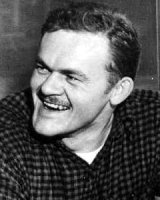A Quote by Jennifer Egan
happened as I listened: I felt pain. Not in my head, not in my arm, not in my leg; everywhere at once. I told myself there was no difference between being “inside” and being “outside,” that it all came down to X’s and O’s that could be acquired in any number of different ways, but the pain increased to a point where I thought I might collapse, and I limped away.
Related Quotes
He knew how to handle pain. You had to lie down with pain, not draw back away from it. You let yourself sort of move around the outside edge of pain like with cold water until you finally got up your nerve to take yourself in hand. Then you took a deep breath and dove in and let yourself sink down it clear to the bottom. And after you had been down inside pain a while you found that like with cold water it was not nearly as cold as you had thought it was when your muscles were cringing themselves away from the outside edge of it as you moved around it trying to get up your nerve. He knew pain.
What's the difference between bulimics and anorexics?" I ask. "Anorexics are anorexics all the time," she says, "I'm only bulimic when I'm throwing up." Wow. She sounds just like my dad! "I'm only an alcoholic when I get drunk." There are all kinds of addicts, I guess. We all have pain. And we all look for ways to make the pain go away. Penelope gorges on her pain and then throws it up and flushes it away. My dad drinks his pain away. (107)
To remain stable is to refrain from trying to separate yourself from a pain because you know that you cannot. Running away from fear is fear, fighting pain is pain, trying to be brave is being scared. If the mind is in pain, the mind is pain. The thinker has no other form than his thought. There is no escape.
I didn't feel physically sick. But mentally. My mind was twisting in so many ways. (...) We once saw a documentary on migraines. One of the men interviewed used to fall on his knees and bang his head against the floor, over and over during attacks. This diverted the pain from deep inside his brain, where he couldn't reach it, to a pain outside that he had control over.
But pain may be a gift to us. Remember, after all, that pain is one of the ways we register in memory the things that vanish, that are taken away. We fix them in our minds forever by yearning, by pain, by crying out. Pain, the pain that seems unbearable at the time, is memory's first imprinting step, the cornerstone of the temple we erect inside us in memory of the dead. Pain is part of memory, and memory is a God-given gift.
Have you ever experienced a pain so sharp in your heart that it's all you can do to take a breath? It's a pain you wouldn't wish on your worst enemy; you wouldn't want to pass it on to anyone else for fear he or she might not be able to bear it. It's the pain of being betrayed by a person with whom you've fallen in love. It's not as serious as death, but it feels a whole lot like it, and as I've come to learn, pain is pain any way you slice it.
Once the pain-body has taken you over, you want more pain. You become a victim or a perpetrator. You want to inflict pain, or you want to suffer pain, or both. There isn't really much difference between the two. You are not conscious of this, of course, and will vehemently claim that you do not want pain. But look closely and you will find that your thinking and behavior are designed to keep the pain going, for yourself and others. If you were truly conscious of it, the pattern would dissolve, for to want more pain is insanity, and nobody is consciously insane.
And yet I understood the alienation of being around others who couldn't really see you or chose not to. I'd felt the self-loathing that came with being a fraud, protraying an image of what you wished you could be but weren't. I'd lived with the fear that people you loved might turn away from you if they ever got to know the true person hidden inside.
Facing the darkness, admitting the pain, allowing the pain to be pain, is never easy. This is why courage - big-heartedness - is the most essential virtue on the spiritual journey. But if we fail to let pain be pain - and our entire patriarchal culture refuses to let this happen - then pain will haunt us in nightmarish ways. We will become pain's victims instead of the healers we might become.
I imagined a psychic pain growing inside him (myself) that demanded some physical outlet. Suicide must have been his attempt to give Pain a body, a representation, to put it outside himself. A need to convert inner torment into some outward tangible wound that all could see. It was almost as though suicide were a last-ditch effort at exorcism, in which the person sacrificed his life in order that the devil inside might die.







































